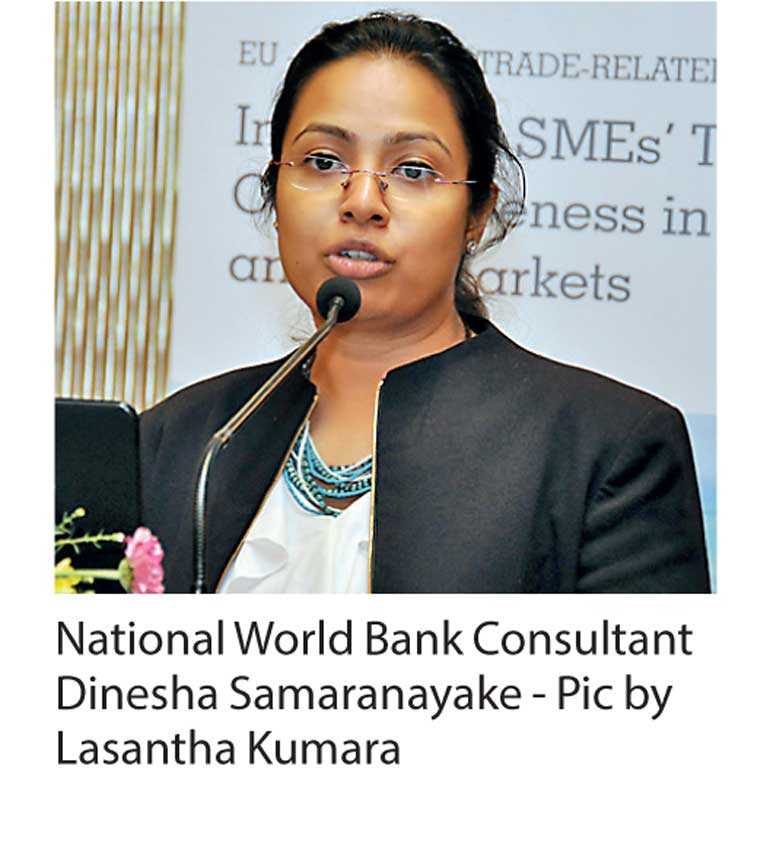Tuesday Feb 17, 2026
Tuesday Feb 17, 2026
Wednesday, 25 July 2018 00:02 - - {{hitsCtrl.values.hits}}

By Charumini de Silva
The World Bank yesterday said that the implementation plan of the National Single Window (NSW) to achieve a single-entry point to fulfil trade-related regulatory requirements would be presented to the Government by the end of this month.
“The PM Group will be handing over the report to World Bank and following some consultations within the bank. The implementation plan of the blueprint on NSW will be handed over to the Government by end of July,” World Bank Consultant Dinesha Samaranayake said, addressing the third public-private consultation on NSW organised by the International Trade Centre (ITC) in Colombo yesterday.
Outlining the objectives of the session and providing an update on the latest development of the World Bank initiative in developing a blueprint for the implementation of the NSW in Sri Lanka, she said that different outputs had been delivered under eight key sectors which include legal and regulatory, governance and operational models, revenue model and fee structure, technical and functional architecture, service level agreements, business process re-engineering change management and communications, risk management strategy and implementation and capacity building.
“All of these reports have been distributed to the National Trade Facilitation Committee (NTFC) and we expect the change management and communications as well as the capacity building plan to be delivered by this month, in addition to the implementation plan,” she added.
In developing the blueprint, she noted that it included a dozen one-to-one consultations, particularly with the team that developed the Trade Information Portal (TIP), in addition to the many one-to-one consultations with Government agencies and large group events including technical assistance.
“There have been a lot of discussions and consultations for the blueprint process, which took about seven months from November last year, but the implementation is much a more complex process than compiling the blueprint,” Samaranayake pointed out.
Insisting that the NSW was a country level initiative that required a lot of consultation and collaboration with different stakeholders, she stressed that it was not something that could happen overnight. “It is important to understand the concerns of all stakeholders before the implementation of the blueprint. Hence, the key decisions that are required to be made during implementation can actually be advanced earlier and as a result some of the delays that you expect during the implementation can actually be reduced,” she added.
She said the World Bank had shared the operational model in March this year, which looks at models built on implementation phase as well as the operational phase of the blueprint.
“There are three operation recommendations given in the report, but irrespective of the options, the key is that there are very specific technical management skills that are required in this operation model needs to be played by the private sector in terms supporting with finance, technical assistance or management assistance. There are specific options again discussed in the revenue and the fee model which includes a no fee based, not having a fee initially to encourage users to use the system more and having a user fee which could have different variations such as annual fee or a trade transaction fee,” she stated.
In terms of the next steps, Samaranayake asserted that once the preparation phase and the blueprint were completed, they expected a program setup for acquisition and procurement, which would then go to the implementation and operational phase of the NSW.
“The World Bank has been requested to support the acquisition and implementation phase by the Government, and currently the bank is exploring the possibility of financing this, possibly through a project that looks at the overall trade and logistics environment,” she added.
The Government committed to create a NSW as a national priority to reduce time and costs currently spent by traders in preparing and submitting information and documents to multiple border regulatory agencies. The NSW will allow parties involved in trade and transport to lodge information and documents with a single-entry point to fulfil all import, export, and transit-related regulatory requirements.
The objective of the public-private consultation is to facilitate the exchange of views between trade stakeholders on the governance mechanism for the NSW. The recommendations from this consultation will be shared with the NTFC as well as the World Bank Group which are currently involved in the development of Single Window Blueprint that will formulate recommendations for the consideration of the Government of Sri Lanka as the country proceeds towards implementation.